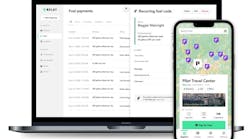It sounds simple enough. But maybe some fleet owners pressed to fill empty drivers' seats feel they can't afford the time or effort it takes to complete a thorough background check.
Like the old ad campaign warned about filters, background checks for driver hires come down to whether you'll pay now or pay later (and probably more).
That's the word from Peter Van Dyne, technical director for the loss prevention department of Liberty Mutual, who is responsible for U.S. transportation consulting services for the insurance provider.
Van Dyne says the number-one finding from Liberty Mutual's latest [2003] “Trucker's Survey” of 119 trucking companies shows that to “avoid hiring your next accident, do a driver background check.
“Our results show that drivers with bad records [going in] will remain drivers with bad records regardless of how much training you give them,” he asserts.
“While hiring drivers with ‘clear’ driving records requires more time and effort in the beginning, it pays off in big savings down the road,” he contnues.
“In fact,” says Van Dyne, “companies with 70% or more clear driving records had a 30% lower median crash frequency. With an average rate of $18,129 per crash, with a company average of four crashes per year, that's a savings of $21,752.”
According to Van Dyne, to be effective, a driver background-checking process should cover these six points:
-
Verifying citizenship
-
Requesting references from past employers
-
Investigating work-history gaps
-
Conducting a criminal background check
-
Conducting extensive road tests of more than two hours with cargo delivery
-
Creating job descriptions and getting a physician's opinion on applicant's ability to perform [said job]
And while completing all these tasks is important, Van Dyne says carriers that employ the last two checks — extensive road testing and job description with physician sign-off — reported lower crash frequencies and lower accidents severity rates.
Moving beyond driver selection as a contributor to safe performance, Van Dyne says those companies in the survey with the best safety records also exhibited these characteristics:
-
Require seat belt use. “Companies that have, and enforce, a seat belt policy have a 50% lower crash frequency.”
-
Govern equipment speed. “Companies that set the governors below 70 had a 35% lower crash frequency.”
-
Use skid-pan training. “Companies with such a program had a 40% lower median crash frequency.”
-
Place name and phone number on trailers. “Companies with names and numbers on their trailers had substantially lower crash cost per million miles.”
-
Employ incentive programs. “Companies with incentive programs had 25% lower median crash costs per million miles.”
-
Install GPS systems “Companies with GPS had a 20% lower median crash frequency.”
-
Download Electronic Control Module (ECM)) data frequently. “Companies that download ECM data when the vehicle is serviced rather than after crashes or randomly had a 30% lower median crash frequency.”
-
Provide in-vehicle training. “Companies that provide such training had a 20% lower median crash frequency.”
But the best defense is a good offense. And that means not hiring any accidents about to happen.
For more information on Liberty Mutual's loss-prevention efforts for trucking operations, go to www.libertymutual.com or phone 617-357-9500.


